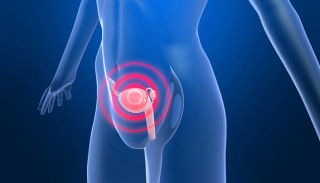How are head and neck cancers staged and what, created at May 09, 2009
|
What are the warning signs of head and neck cancers?created at May 09, 2009 1,296 1,296 Warning signs of head and neck cancers depend on the location of the cancer. Sometimes there are no warning signs. That's why men and women over 40 may wish to get an annual cancer-related health checkup, |
What are the major contributing factors for head and neck cancers?created at May 09, 2009 1,404 1,404 The major causes (etiologic factors) for head and neck cancers are tobacco and alcohol use, |
What if the surgery doesn't help for sinus surgery ?created at May 08, 2009 1,165 1,165 First, |
How is treatment different after surgery?created at May 08, 2009 1,145 1,145 It doesn't mean that you won't get sinusitis any more, |
What is done if I have to have sinus surgery?created at May 08, 2009 1,184 1,184 You should first understand that I am not a surgeon, |
When should surgery be considered?created at May 08, 2009 1,147 1,147 A small percentage of patients with chronic sinusitis will fail to improve even with the best medical treatment. In most studies of patients treated by allergists who specialize in treatment of chronic sinusitis, |
What effect do nasal polyps have on sinus problems?created at May 08, 2009 1,125 1,125 Nasal polyps are not true polyps but rather are probably caused by inflammation in the nose. They look like peeled grapes but are basically fluid-filled sacs. They can be found anywhere in the sinuses or nose and commonly are associated with sinus infectio... |
What kind of effects do tobacco smoke and other irritants have on the sinuses?created at May 08, 2009 1,261 1,261 Tobacco smoke and various other irritants may cause worsening of symptoms. Those irritants include auto exhaust, |
Why do I have to keep my nose clear? I can breathe through my mouth.created at May 07, 2009 1,212 1,212 While you can breathe through your mouth, |
Why do we have sinuses?created at May 06, 2009 1,296 1,296 The sinuses are air pockets located inside the bones in the skull. They are located to either side of the nose (maxillary), |
What is the treatment for Lyme disease?updated at Oct 31, 2025 1,124 1,124 Key Points about Lyme Disease Treatment?:Antibiotics are the Primary Treatment: The standard treatment for Lyme disease is with antibiotics.Early Treatment is Crucial: Antibiotics are most effective when started as early as possible after infection.Prompt ... |
What are the symptoms of Lyme disease?created at May 06, 2009 1,298 1,298 Lyme disease can affect any part of the body and cause many different symptoms. The commonest symptoms relate to the person feeling unwell, |
How to remove attached ticks ?created at May 06, 2009 1,259 1,259 Prompt removal of ticks decreases the chances of getting Lyme disease. The proper and easiest method is to grasp the tick with fine tweezers, |
Side effects of vulvar cancer surgerycreated at May 05, 2009 1,338 1,338 The consequences of curative surgery can be psychologically devastating, |
Questions a woman may want to ask her doctor before treatment begins for vulvar cancercreated at May 05, 2009 1,093 1,093 Here are some questions a woman may want to ask her doctor before treatment begins: What is my diagnosis? What is the stage of the disease? What are my treatment choices? Which do you recommend for me? Why? What are the chances that the treatment will be s... |
Side effects of radiation therapy for ovarian cancercreated at May 05, 2009 1,125 1,125 Radiation therapy mainly causes fatigue, |
Side effects of chemotheray for ovarian cancercreated at May 05, 2009 1,086 1,086 With chemotherapy, |
How will my doctor know if I have ovarian cancer?created at May 05, 2009 1,158 1,158 Women who have regular pelvic exams increase the chance that, |
What are the symptoms for ovarian cancer?created at May 05, 2009 1,125 1,125 As a tumor grows, |
What are the causes and risk factors for ovarian cancer?created at May 05, 2009 1,111 1,111 It is difficult to discover what actually causes cancer from one person to another, |
Things to preapre for Cervical Cancer Treatmentcreated at May 04, 2009 1,162 1,162 Here are some questions you may want to ask your doctor before treatment begins: What is the stage (extent) of my disease? What are my treatment choices? Which do you recommend? Why? What are the chances that the treatment will be successful? Would a clini... |
How is cancer of the cervix treated?created at May 04, 2009 1,429 1,429 The choice of treatment for cervical cancer depends on the location and the size of the tumor, |
How are precancerous conditions of the cervix treated?created at May 04, 2009 1,142 1,142 All treatments directed toward neoplastic conditions of the cervix should be based on a biopsy and not a Pap smear alone. Treatment for a precancerous lesion of the cervix depends on a number of factors. These factors include whether the lesion is low or h... |
What is the difference between precancerous conditions and cancer of the cervix?created at May 04, 2009 1,130 1,130 Cells on the surface of the cervix sometimes appear abnormal but not cancerous. Scientists believe that some abnormal changes in cells on the cervix are the first step in a series of slow changes that can lead to cancer years later. That is, |
The treatment for Pancreatic Cancer? What should I ask?created at May 04, 2009 1,152 1,152 Three kinds of treatment are used for pancreatic cancer: Surgery – taking out the cancer in an operation Radiation therapy – using high-dose x-rays or other high-energy rays to kill cancer cells Chemotherapy – using drugs to kill cancer cells A doctor m... |
What are the causes and risk factors for pancreatic cancer?created at May 04, 2009 1,125 1,125 It is difficult to discover what actually causes cancer from one person to another, |
The symptoms for liver cancer?created at May 04, 2009 1,183 1,183 These symptoms might be caused by liver cancer: Unexplained weight loss Anorexia (persistent lack of appetite) Early satiety (feeling very full after a small meal) Persistent abdominal pain Increasing abdominal girth (swelling of the "stomach" area) with o... |
Radiation Therapy for Colorectal Cancercreated at May 04, 2009 1,176 1,176 Radiation therapy (also called radiotherapy) is the use of high-energy rays to damage cancer cells and stop them from growing. Like surgery, |
Chemotherapy for Colorectal Cancercreated at May 04, 2009 1,124 1,124 Chemotherapy is the use of drugs to kill cancer cells. Chemotherapy is sometimes given after surgery for colorectal cancer to try to prevent the disease from recurring, |

